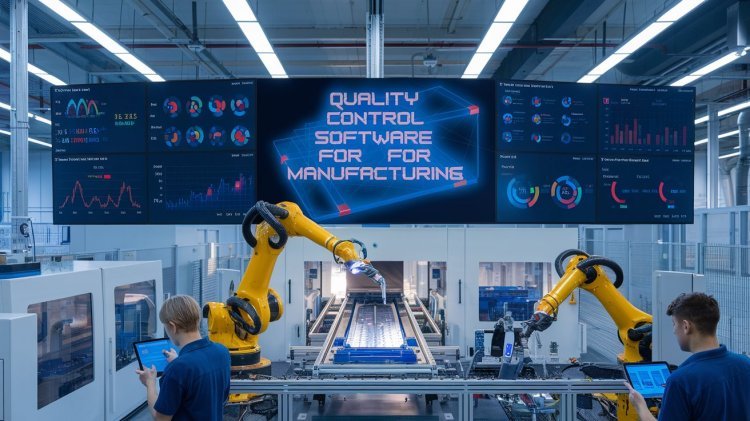Quality Control Software for Manufacturing: Boosting Precision and Efficiency
Quality control software for manufacturing automates inspections, tracks defects, and ensures compliance. It enhances product quality, boosts efficiency, and reduces costs, making it essential for modern manufacturers to maintain high standards.

In the manufacturing industry, maintaining high product quality standards is critical for consumer pleasure and business success. With the increasing complexity of manufacturing processes, manual quality checks are no longer adequate. Quality control software has emerged as a game changer, assisting firms in achieving consistent quality, reducing errors, and meeting compliance criteria with ease.
Let's look at how quality control software may optimize production operations and increase overall efficiency.
What is Quality Control Software?
Quality control software is a digital system for monitoring, managing, and automating quality assurance operations in manufacturing. It aids in defect tracking, production data analysis, and standardization throughout the manufacturing process. Manufacturers can immediately detect and address faults using real-time data, ensuring that goods match the relevant criteria.
Key Features of Quality Control Software
-
Real-Time Data Collection
Quality control software integrates with manufacturing equipment to collect real-time data on product quality. This data is immediately available for analysis, allowing managers to spot defects early and take corrective actions. -
Automated Inspections
Automated inspections replace time-consuming manual checks, ensuring accuracy and reducing the chance of human error. Software can be programmed to inspect products at various stages of production, from raw materials to finished goods. -
Non-Conformance Tracking
Quality control software helps track and document any non-conformance with quality standards. It generates reports on defects, allowing manufacturers to quickly address root causes and prevent future occurrences. -
Compliance Management
In industries where regulatory compliance is key, quality control software ensures that manufacturing processes align with required standards. The software can generate audit trails and certification reports to meet industry regulations. -
Statistical Process Control (SPC)
This feature allows manufacturers to monitor production quality using statistical methods. It helps identify variations in the production process that could lead to defects, enabling proactive adjustments to maintain quality.
Benefits of Quality Control Software for Manufacturing
-
Improved Product Quality: By catching defects early and automating inspections, manufacturers can ensure that products meet the highest quality standards.
-
Increased Efficiency: Automating the quality control process speeds up production and reduces downtime. Employees can focus on other critical tasks while the software handles monitoring and reporting.
-
Cost Savings: Fewer defects mean fewer reworks and recalls, which translates to cost savings. Preventing issues early in the production process also reduces material waste and labor costs.
-
Enhanced Customer Satisfaction: Consistently delivering high-quality products builds trust with customers and enhances brand reputation, leading to repeat business and customer loyalty.
Top Quality Control Software for Manufacturing
-
MasterControl
MasterControl offers a comprehensive quality management system (QMS) that includes document control, risk management, and compliance features. It’s ideal for manufacturers in highly regulated industries. -
IQMS
IQMS provides real-time data collection and analysis, ensuring that manufacturers can monitor every step of production. Its integrated approach helps reduce errors and ensure consistent quality. -
ETQ Reliance
ETQ Reliance is known for its flexibility and scalability. It offers features like SPC, non-conformance tracking, and compliance management, making it suitable for manufacturers of all sizes. -
UniPoint
UniPoint’s easy-to-use interface helps manufacturers manage inspections, audits, and defect tracking. It’s perfect for small to medium-sized manufacturers looking to streamline their quality control processes.
Why You Need Quality Control Software
With increased competition and higher customer expectations, manufacturers cannot afford to make shortcuts on product quality. Implementing quality control software is a proactive step toward maintaining standards, increasing efficiency, and ensuring regulatory compliance. Whether you manage a small manufacturing plant or a large-scale operation, investing in the proper software will keep you ahead of the competition.
In today's fast-paced manufacturing world, quality control software is no longer optional—it is required. By automating essential operations, detecting faults, and assuring compliance, manufacturers may improve product quality, increase operational efficiency, and cut costs. If you are serious about maintaining high-quality manufacturing processes, you should look into the best quality control software alternatives available.
About Axonator Inc:
At Axonator, our vision is bold and transformative: to mobilize the world. We see a future where businesses and communities are effortlessly interconnected through the power of mobile technology. Our mission is to equip organizations globally with cutting-edge mobile solutions, unlocking new possibilities for innovation, efficiency, and seamless collaboration in every facet of their operations.
Contact:
Axonator Inc. (The World On Mobile)
Austin, TX, USA
USA: +1-716-274-8885
India: +91-8600-032-635
Email: support@axonator.com
Website: https://axonator.com/
What's Your Reaction?

















